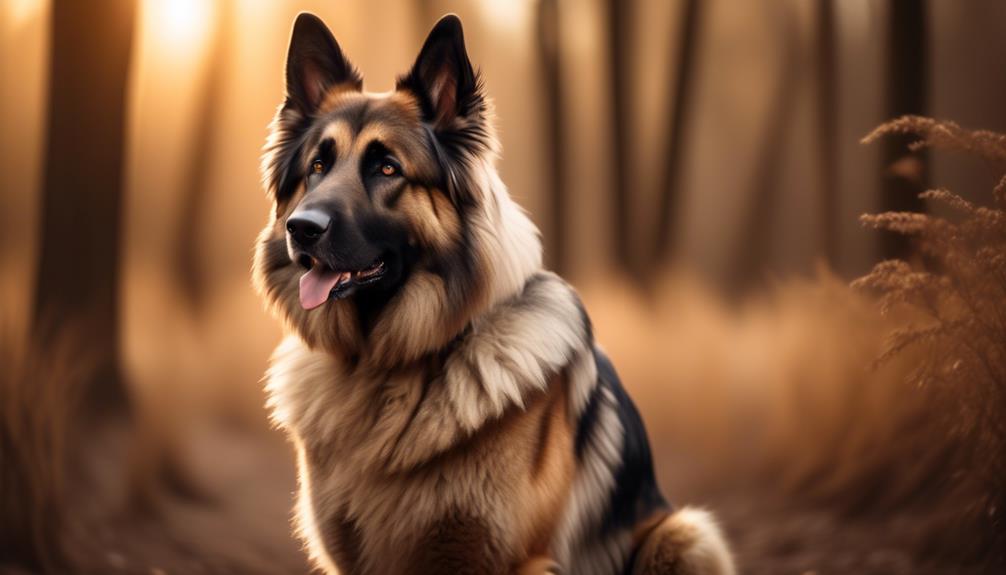
The Shiloh Shepherd, often overlooked by major kennel clubs, is a breed that possesses a certain charm that sets it apart from others. Its regal stature and gentle disposition make it an appealing choice for dog lovers seeking a loyal companion.
But what makes the Shiloh Shepherd truly unique? In this discussion, we will uncover the fascinating origin, size, and coat characteristics of this breed. We will also explore its adaptability to apartment living and the important considerations to keep in mind when choosing a dog for this type of environment.
But that’s not all. Stay tuned to discover the crucial health and care guidelines, feeding recommendations, and the breed’s interaction with children and other pets. There’s so much more to learn about the Shiloh Shepherd’s extraordinary qualities and the best ways to ensure its overall well-being.
Key Takeaways
- Shiloh Shepherds are a large breed of dog originating from the United States.
- They have a long, double coat that can come in various colors.
- Shiloh Shepherds can adapt well to apartment living, but consideration should be given to their energy levels and behavior.
- Regular veterinary care and proper grooming are important for the health and well-being of Shiloh Shepherds.
Origin and Size
The Shiloh Shepherd dog breed, originating in the United States, is known for its impressive size and stature. These dogs are large and powerful, with males standing 28-30 inches tall at the shoulder and weighing between 100-140 pounds. Females are slightly smaller, measuring 26-28 inches tall and weighing between 80-120 pounds.
Despite their size, Shiloh Shepherds can adapt well to apartment living, although suitability goes beyond size alone. When choosing a dog for an apartment, it’s important to consider energy levels, space requirements, and the dog’s behavior.
Shiloh Shepherds are generally quiet, low-energy dogs that exhibit polite behavior, making them a good choice for apartment living. However, it’s essential to prioritize the comfort of neighbors and create a harmonious living environment for everyone involved.
See another Dog breed profile.
Shiranian Mixed Dog Breed
Breed Group and Lifespan
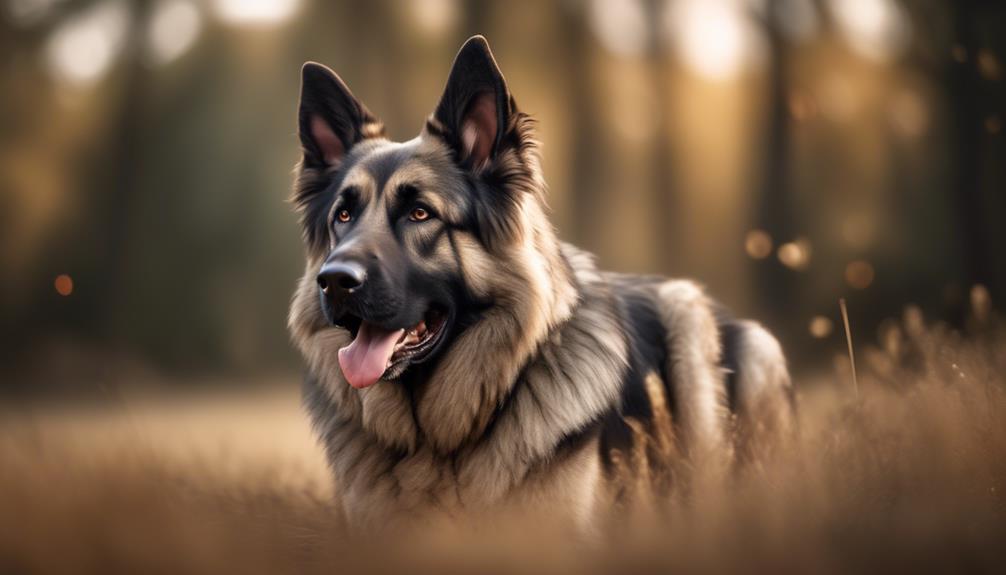
Shiloh Shepherd dogs don’t belong to a recognized breed group by major kennel clubs but have a lifespan of 9-14 years. While they may not have an official breed group, the Shiloh Shepherd still offers a unique and rewarding experience for dog owners.
Here are four reasons why their lack of recognition shouldn’t deter potential owners:
- Individuality: Shiloh Shepherds stand out from the crowd, showcasing their distinctive qualities and characteristics.
- Exclusivity: Owning a Shiloh Shepherd means being part of a select group of dog enthusiasts who appreciate their special breed.
- Uniqueness: With their own distinct breed history and development, Shiloh Shepherds offer a one-of-a-kind canine companionship.
- Independent Spirit: These dogs embody a sense of individuality and independence, making them a fascinating choice for those seeking a dog with a strong character.
Despite not belonging to a recognized breed group, the Shiloh Shepherd’s lifespan and unique qualities make them a cherished and rewarding addition to any family.
Coat Colors and Characteristics
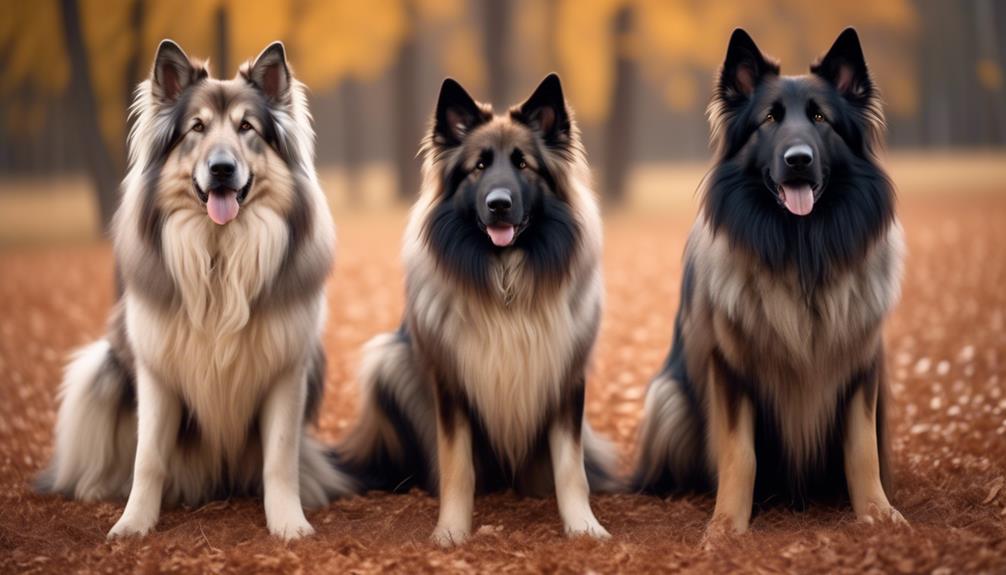
After exploring the unique qualities and benefits of owning a Shiloh Shepherd, it’s important to delve into the coat colors and characteristics of this distinctive breed.
Shiloh Shepherds have a variety of coat colors, including black and tan, black, sable, or white. Their coat is long and double, providing them with protection against the elements. The dense fur requires regular brushing to prevent matting and keep it looking its best. Additionally, their coat sheds moderately, so regular grooming is necessary to keep the house clean.
Shiloh Shepherds have a regal and majestic appearance, with a strong and muscular build. They have a confident and calm demeanor, making them an ideal companion for families and individuals who enjoy an active lifestyle.
Adaptability to Apartment Living
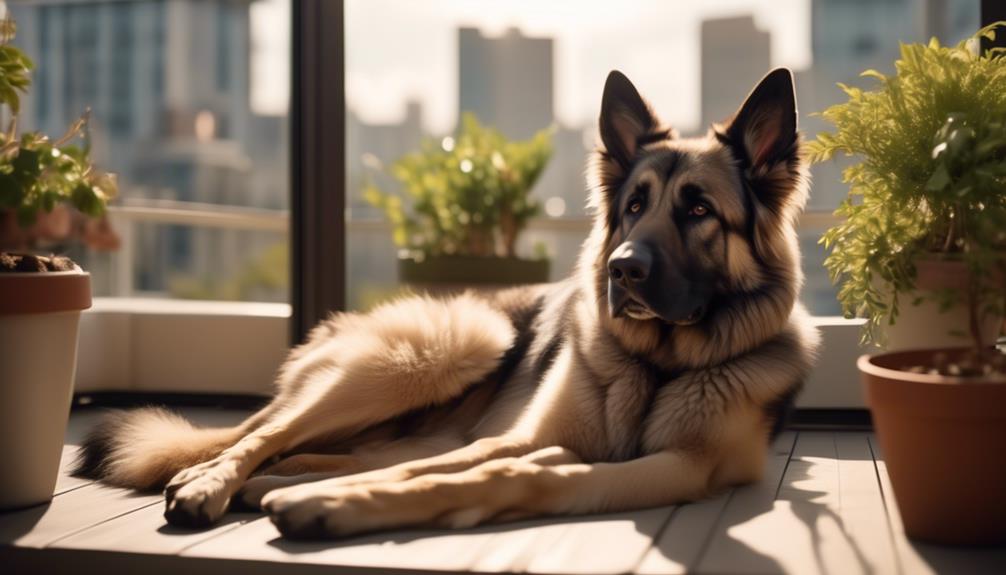
When considering the adaptability of Shiloh Shepherds to apartment living, it’s important to take into account various factors. Here are four key points to consider:
- Shiloh Shepherds can adapt well to apartment living. Despite their large size, they can still thrive in a smaller living space.
- Suitability for apartment living goes beyond size. It’s important to consider the dog’s energy levels, behavior, and noise level.
- Consider neighbors’ comfort when selecting a dog. Dogs that are quiet, low-energy, and exhibit polite behavior are desirable in an apartment setting.
- Some small dogs may not be suitable for apartments due to high energy levels and frequent barking. Size alone shouldn’t be the sole determinant when choosing a dog for apartment living.
Considerations for Choosing an Apartment Dog
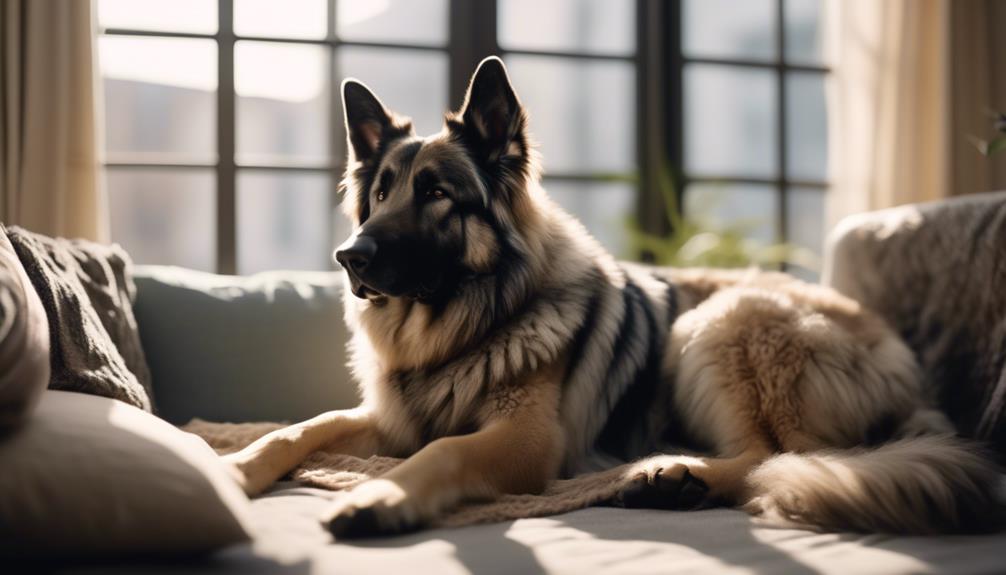
One important factor to consider when choosing a dog for apartment living is the dog’s compatibility with a smaller living space. Size alone shouldn’t be the sole determinant, as there are small dogs that may not be suitable for apartments due to high energy levels and frequent barking.
It’s essential to prioritize qualities such as being quiet, low-energy, calm indoors, and exhibiting good manners. This creates a harmonious living environment for everyone involved, including neighbors.
Additionally, considering your dog-owning experience is crucial when choosing a new pooch. It’s important to select a dog that fits well into your lifestyle and can adapt to the limitations of apartment living.
Shiloh Shepherd Health and Care
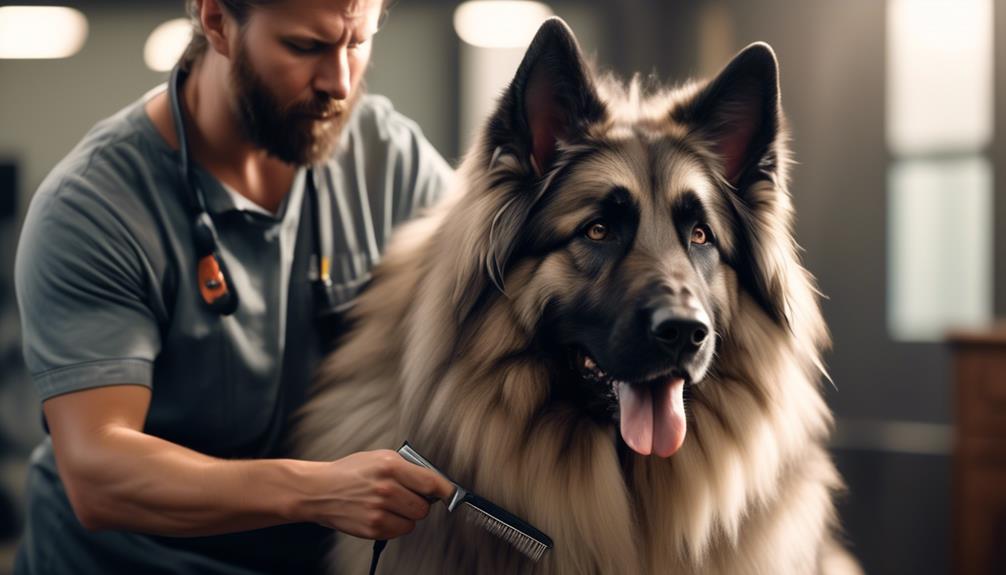
To properly care for a Shiloh Shepherd, it’s crucial to understand their specific health needs and how to provide adequate care. Here are some important factors to consider when it comes to the health and care of a Shiloh Shepherd:
- Common health concerns:
- Shiloh Shepherds are predisposed to certain health conditions such as panosteitis, megaesophagus, hip dysplasia, bloat, and perianal fistula.
- It’s important to be aware of these conditions and monitor your dog’s health regularly.
- Regular veterinary checkups:
- Regular visits to the vet are essential to ensure your Shiloh Shepherd’s overall health and well-being.
- These checkups can help identify any potential health issues early on and allow for timely intervention.
- Proper care:
- Providing proper care for your Shiloh Shepherd involves preventive measures such as preventing weight gain, regular ear cleaning, nail trimming, and teeth brushing.
- Additionally, special care should be given to Shiloh Shepherd puppies to ensure their healthy growth and development.
- Overall well-being:
- Taking care of your Shiloh Shepherd’s health isn’t just about addressing specific health concerns, but also about promoting their overall well-being.
- This includes providing a balanced diet, regular exercise, mental stimulation, and a safe and loving environment.
- By prioritizing their health and well-being, you can ensure that your Shiloh Shepherd lives a happy and healthy life.
Common Health Concerns
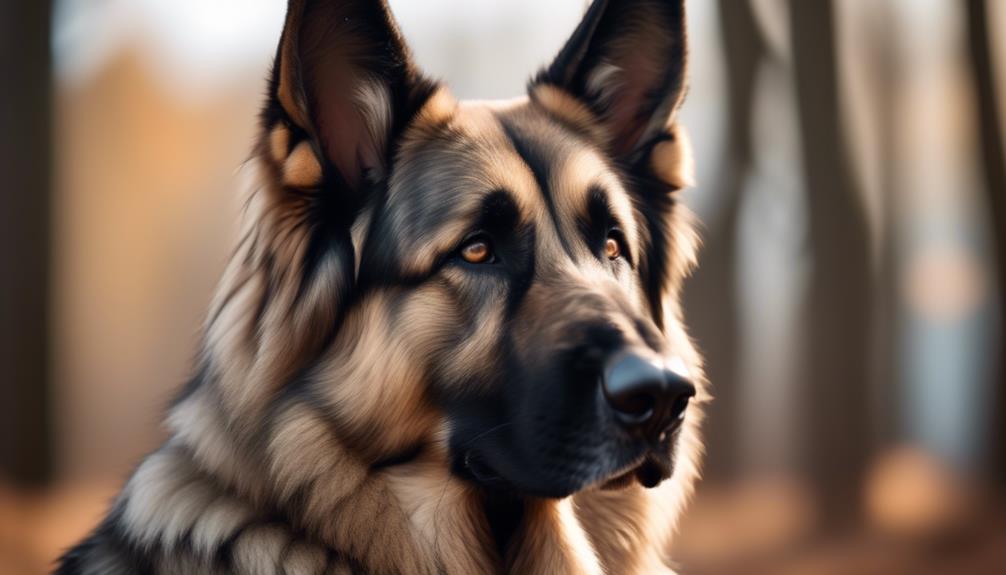
Shiloh Shepherds are prone to several common health concerns that owners should be aware of and monitor regularly. These health concerns include panosteitis, megaesophagus, hip dysplasia, bloat, and perianal fistula. Regular veterinary checkups are essential to detect and address these issues early on. Additionally, owners should take preventive measures such as preventing weight gain and providing regular ear cleaning, nail trimming, and teeth brushing. Special care should also be given to Shiloh Shepherd puppies. To provide a clear and concise overview of these common health concerns, the following table presents a summary of each condition, its symptoms, and recommended actions for owners:
| Health Concern | Symptoms | Recommended Actions |
|---|---|---|
| Panosteitis | Lameness, pain, swelling | Consult a veterinarian for pain management |
| Megaesophagus | Regurgitation, difficulty eating | Feed the dog in an elevated position |
| Hip Dysplasia | Hind limb lameness, discomfort | Regular exercise, joint supplements, and pain relief |
| Bloat | Distended abdomen, restlessness | Seek immediate veterinary assistance |
| Perianal Fistula | Sores near the anus | Consult a veterinarian for treatment options |
Regular Veterinary Checkups
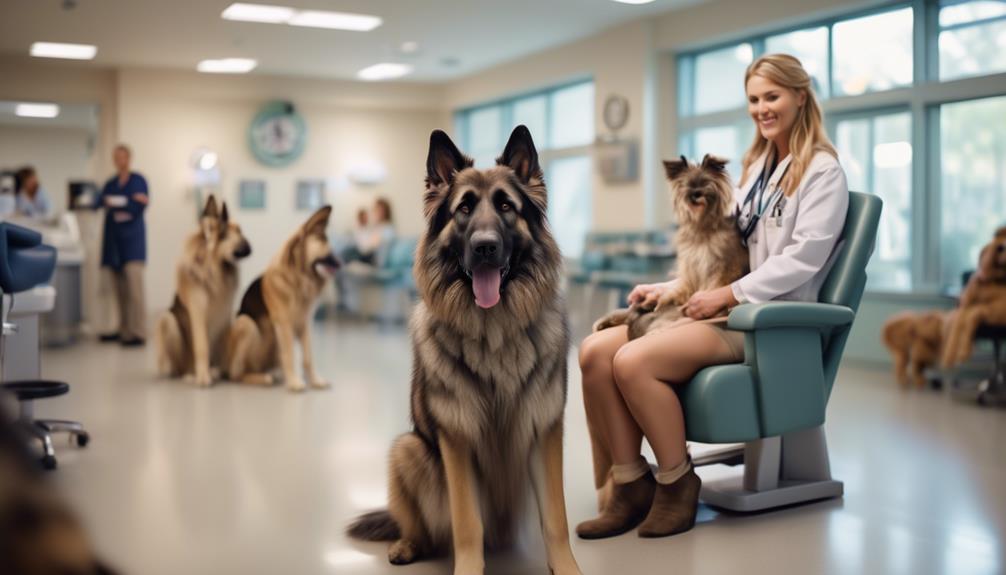
After discussing the common health concerns for Shiloh Shepherds, it’s important to highlight the significance of regular veterinary checkups. These checkups are crucial for ensuring the overall health and well-being of these magnificent dogs.
Here are four reasons why regular veterinary checkups are essential:
- Early detection of health issues: Regular checkups allow veterinarians to catch any potential health problems early on, increasing the chances of successful treatment and preventing further complications.
- Preventive care: Veterinarians can provide necessary vaccinations, perform routine tests, and offer advice on proper nutrition and exercise to prevent diseases and maintain optimal health.
- Tailored healthcare plans: Regular checkups allow veterinarians to create personalized healthcare plans for each Shiloh Shepherd, taking into account their specific needs and lifestyle.
- Peace of mind: Regular veterinary checkups provide dog owners with peace of mind, knowing that their beloved Shiloh Shepherd is receiving the best possible care and attention.
Feeding Recommendations
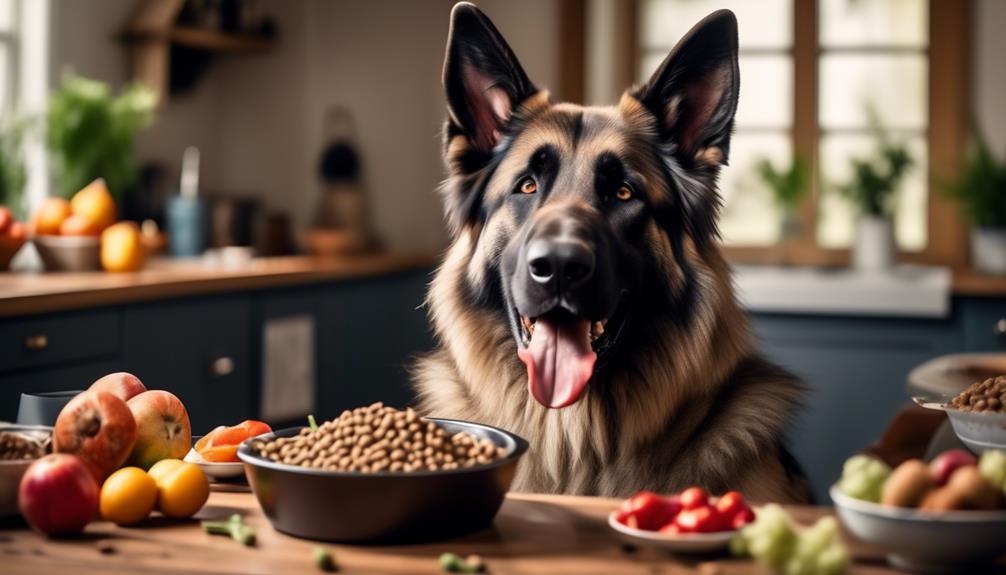
Regular veterinary checkups are essential for maintaining the overall health and well-being of Shiloh Shepherds. As a large-sized breed with moderate to high energy, Shiloh Shepherds require a formulated diet that meets their nutritional needs.
It’s important to stick to a regular feeding schedule and limit treats to prevent weight gain. Their dietary needs change from puppyhood to adulthood, so it’s crucial to adjust their food accordingly. Providing a balanced diet that includes high-quality protein, healthy fats, and carbohydrates is key to keeping them healthy and active.
Additionally, it’s advisable to consult with a veterinarian to determine the appropriate portion sizes and feeding frequency for your Shiloh Shepherd.
Coat Color and Grooming
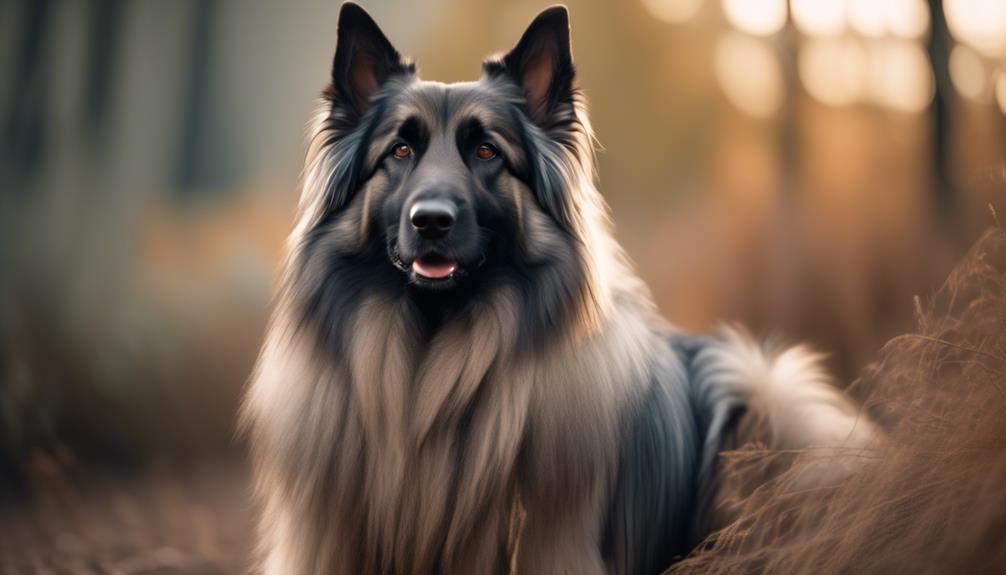
The Shiloh Shepherd has a variety of coat colors, including black and tan, black, sable, and white. Regular grooming is essential to maintain their coat. Here are some tips to keep their coat looking its best:
- Brush regularly: Regular brushing helps to remove loose hair and prevent matting. It also promotes healthy skin and coat.
- Bathing: Shiloh Shepherds should be bathed as needed, using a gentle dog shampoo. Be sure to thoroughly rinse the coat to remove all shampoo residue.
- Nail trimming: Regular nail trimming is important to prevent overgrowth and discomfort. It’s recommended to trim the nails every 4-6 weeks.
- Ear cleaning: Regularly check and clean the ears to prevent infection. Use a gentle ear cleaning solution and a cotton ball to wipe away any debris.
Interaction With Children and Other Pets
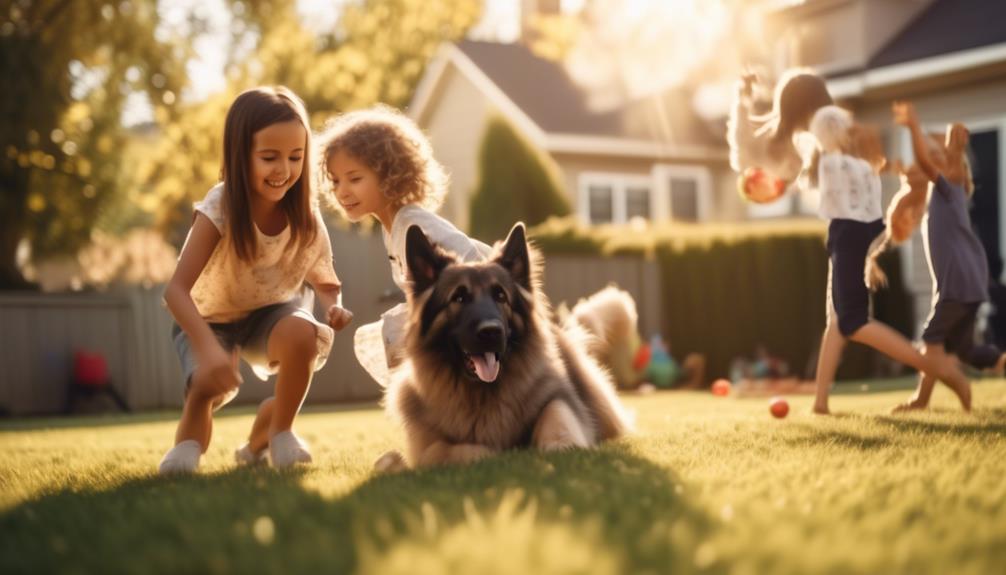
To ensure a harmonious living environment for everyone involved, including children and other pets, proper interaction and supervision are important for Shiloh Shepherds.
These dogs are generally gentle and patient with children, making them great family pets. However, it’s crucial to teach children how to properly interact with dogs and to always supervise their interactions.
Shiloh Shepherds also tend to get along well with other pets, but early socialization is key to ensure positive relationships. Introducing them to different animals and teaching them proper manners from a young age can help foster a peaceful coexistence.
Frequently Asked Questions
Are Shiloh Shepherds Recognized by Major Kennel Clubs?
No, major kennel clubs do not recognize the Shiloh Shepherd breed.
What Are Some Common Health Concerns for Shiloh Shepherds?
Some common health concerns for Shiloh Shepherds include panosteitis, megaesophagus, hip dysplasia, bloat, and perianal fistula. Regular veterinary checkups and proper care are important to ensure their well-being.
How Often Should I Take My Shiloh Shepherd to the Vet for Checkups?
They should take their Shiloh Shepherd to the vet for regular checkups. It is important to maintain their health and catch any potential issues early on. Regular veterinary care ensures the well-being of the dog.
What Is the Recommended Feeding Schedule for a Shiloh Shepherd?
The recommended feeding schedule for a Shiloh Shepherd is to formulate a diet for a large-sized breed with moderate to high energy. Stick to a regular schedule, limit treats, and adjust the diet as they transition from puppyhood to adulthood.
Do Shiloh Shepherds Have Any Specific Grooming Needs Based on Their Coat Color?
Shiloh Shepherds have specific grooming needs based on their coat color. Daily brushing is required for their variety of coat colors. Regular veterinary checkups are important for their overall health and care.
Conclusion
In conclusion, the Shiloh Shepherd is a remarkable breed with its impressive size, striking appearance, and gentle temperament. Despite not being recognized by major kennel clubs, it possesses unique qualities that make it a fantastic companion.
This comprehensive guide has provided essential information on the breed’s origin, size, lifespan, coat characteristics, adaptability to apartment living, health and care guidelines, feeding recommendations, coat color variations, and interaction with children and other pets.
Whether you’re considering owning a Shiloh Shepherd or simply interested in learning more, this guide has covered all the important aspects.




